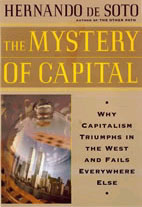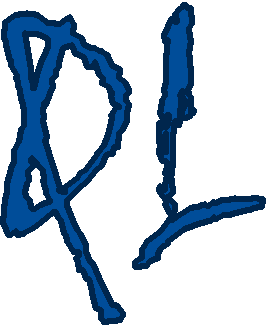However, despite his accurate analysis of the Third World's problems, De
Soto misses the mark in fully explaining why most western nations, particularly
the United States, have been so successful in converting property into
capital that produces wealth. As a result, this unfortunately weakens the
effectiveness of the solutions he offers to developing nations.
An
unconscious endeavor
De Soto references the history of western nations and indicates that they
once had conditions and problems similar to those in the Third World. He
states that over time, especially during the last 200 years, through an
unconscious endeavor, these nations were able to weave together a system
of laws and social contracts that allowed for property to be accounted
for, and for people to be held accountable to their obligations. |

|
However, he fails to explain why the framework for this "unconscious endeavor"
was able to exist within the "bell jar" of western nations. He explains
how western nations were able to integrate their extralegal world, but
not why this happened. He fails to identify what happened 200 years ago
in western nations that allowed for a revolution in capital management.
De Soto suggests that if governments only paid attention to the "barking
dogs" (a term he uses meaning that dogs know the extralegal boundaries
of their owner's property), then they will be on their way to converting
their nation's dead capital, which exists in the vast extralegal or non-legal
realm of a nation, into vibrant, dynamic capital.
His solution is essentially that a nation needs a strong central government
that responds to the needs of the people and can responsibly orchestrate
individual property rights. An entrepreneurial government, if you will,
that both responds to the market demands of its citizens (expressed through
the extralegal realm) and is "consciously" aiming at converting its dead
capital.
|
« His solution is essentially that a nation needs a strong central
government that responds to the needs of the people and can responsibly
orchestrate individual property rights. » |

|
Here's where De Soto falls short. How does a government become centralized
enough so that it can properly coordinate individual property rights and
obligations, yet not become so centralized that it falls back into the
tyranny it is resisting that will eventually infringe on individual property
rights and create an extralegal world that will produce more dead capital?
Part of the answer is in the US model of government (three branches and
a federal system of states, counties, etc.), where the very infrastructure
of government is localized, decentralized and organized. However, the main
answer lies in what took place approximately 200 years ago within the United
States that never happened before in human history and explains why this
"unconscious endeavor" to harness property into capital that produces wealth
took place.
The founders created a nation that recognized that individual rights were
endowed by a higher power, a creator. This concept prohibits the government
from assuming that it has a monopoly on property rights. The government
recognizes that property rights are inalienable and that they come from
a higher power, which is not the government itself. Accordingly, the government
is a humble servant, not the ultimate master, which serves to protect individual
property rights. Laws are created to insure that government or other individuals
do not abrogate an individual's property rights. This explains the "unconscious
endeavor" that took place within the US and in other western nations to
account for all property, because ultimately it was about creating a system
that secured individual rights in deference to a higher power.
Securing
individual rights
This is the critical piece missing in De Soto's analysis. The drive for
converting dead capital into liquid capital isn't necessarily about converting
all illegal property into legal property; it should first be about securing
individual rights. Once this is established, it will be easier for all
of the mechanisms to fall into place within a nation and systemically transform
property into capital.
The reason De Soto missed this is because he wanted to show that there
are few differences between developing nations and the First World. For
example, he discusses how people in most nations are entrepreneurial and
how the histories of western nations are similar to the current conditions
of the third world. Unfortunately in the process he overlooked what made
the US method of governing so radically revolutionary, which was its recognition
that individual rights need to be secured because they come, not from the
government, but from a higher source.
|



